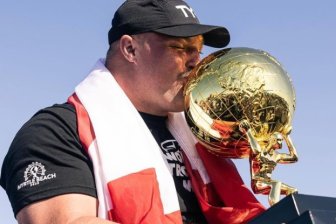Artemis II astronauts see mission as ‘setting the stage’ for deeper space travel | Globalnews.ca
The three Americans and one Canadian who will be the first astronauts to travel around the moon in more than 50 years say they see their mission as “setting the stage” for deeper space travel.
London, Ont., native Jeremy Hansen, Christina Hammock Koch, Victor Glover and Reid Wiseman are scheduled to orbit the moon late next year as part of the Artemis II mission. Hansen, 47, will be the first non-American to leave Earth’s orbit when the mission blasts off in November 2024.
Humans last visited the moon in December 1972 at the end of NASA’s Apollo program. If successful, the astronauts will not only end that drought, but they say the mission will also end up being pivotal for future space flight.
“We are setting the stage for humanity to go to Mars … and we’re all very aware of that,” Glover, 46, the mission’s pilot, said in an interview with The Morning Show, hosted by Jeff McArthur and Carolyn MacKenzie.
“Everything we do is going to be making sure this vehicle is ready to dock to and get people into another spacecraft that can land on the moon. But the objectives of this mission are to make sure that humans can live in Orion.”

NASA’s Orion spacecraft is the cornerstone of the Artemis missions. Orion was used in Artemis I, an unmanned flight, that travelled on a 1.4-million-mile journey beyond the moon, returning to Earth after 25 days last December.
That mission took place to ensure safe re-entry, descent, splashdown and recovery so NASA is ready for Artemis II when a crew is onboard. The goal of Artemis II is to establish a path for a long-term scientific and human presence on the moon, NASA says.
The astronauts, who were visiting Ottawa Tuesday, will orbit Earth after blastoff to test Orion’s systems before rocketing to the moon. They will do a figure eight around it before their momentum brings them home. The mission will take approximately 10 days. The return trip alone will take about four days.
This photo provided by NASA shows, from left, NASA astronauts Christina Koch, Victor Glover and Reid Wiseman, and Canadian Space Agency astronaut Jeremy Hansen at the Johnson Space Center in Houston on March 29, 2023.
Josh Valcarcel/NASA via AP
Following Artemis II, NASA wants to attempt a two-person lunar landing, as early as 2025, with the launch of Artemis III. The end goal is to go to Mars by the late 2030s.
“We need to make sure that we can breathe for 10 days. We have to eat, drink, exercise, use the bathroom … we’ll take a much longer orbit around Earth, where we’ll get to fly the spaceship and test out the systems that will allow us to precisely dock to another spaceship that could take us to the moon surface, or to a gateway that’s orbiting the moon,” Glover said.
“All those things have to work, and most importantly, we have to splash down successfully in the Pacific (Ocean) to make sure that the objectives of the next mission can be accomplished.”
‘Expeditionary behaviour’ key to surviving mission
Hansen, who will serve as a mission specialist alongside Hammock Koch, played up the close relationship the astronauts have when describing the mission.
The former Royal Canadian Air Force CF-18 pilot said they have been working together for “many years” and that he has “complete trust in them.”

Wiseman, the 47-year-old Artemis II commander, characterized that as “expeditionary behaviour … the critical component for humans surviving through this mission.”
“The equipment has to work – that’s first and foremost – but for these four humans sitting here, it really will boil down to how we get along,” he said.
“Luckily, I’m flying with Victor, Christina and Jeremy – three of the finest astronauts and the finest people that I’ve ever met. There’s a quick joke when you need it, there’s a good laugh if you want one and then we lift each other up when we’re down.”

Hammock Koch, 44, added that everyone on the team, not only the astronauts but also the engineers and others involved in the mission, is excited.
“I’m excited about all the things Victor just mentioned: what we’re going to be doing on this mission, the views that we’re going to have, the perspective that we can hopefully bring back; the hopes, dreams and aspirations that we’re going to be bringing with us as we go that far and look back on our earth, the things that we’ll learn about ourselves, the benefits we’ll bring back to Earth – these are all things I’m excited about,” she said.
“But most of all, I’m excited for what this is going to show humanity that when we come together internationally, and with a diverse and inclusive team – when every single contribution is welcome – what we can accomplish.”
— with files from The Canadian Press
© 2023 Global News, a division of Corus Entertainment Inc.
For all the latest World News Click Here
For the latest news and updates, follow us on Google News.




